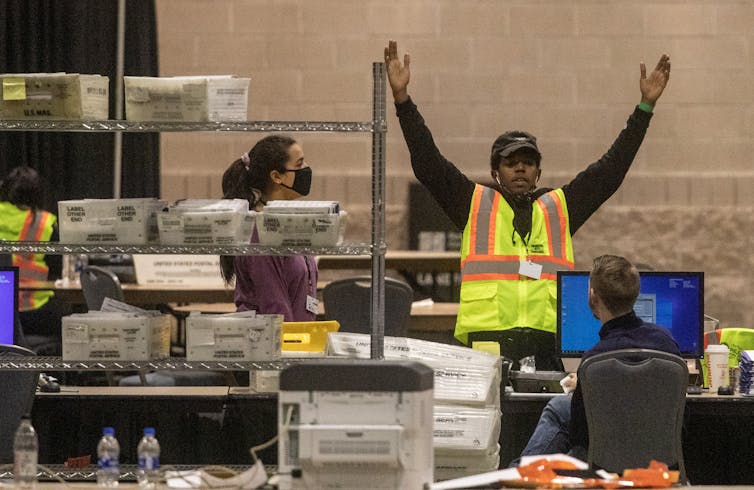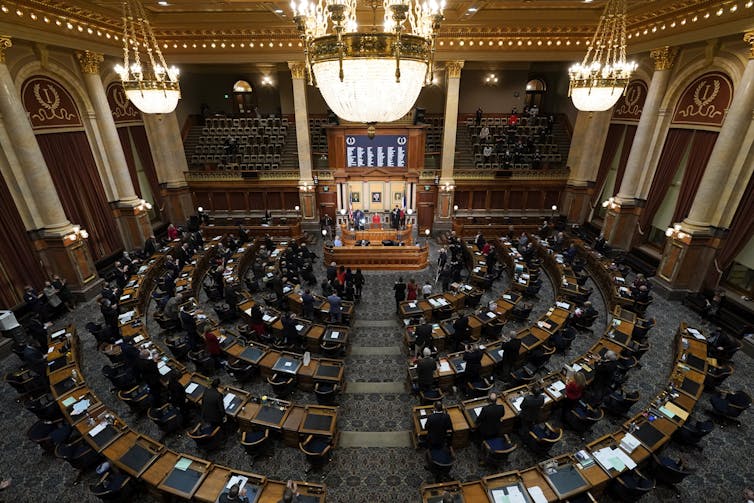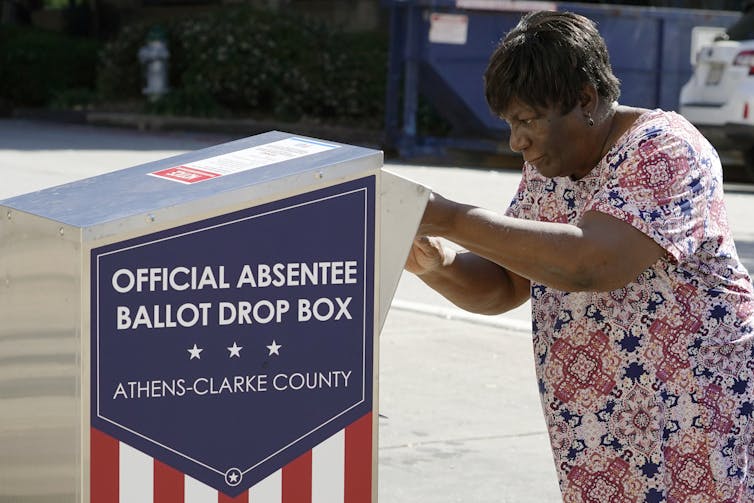Making it harder to vote does threaten democracy
Douglas R. Hess, Grinnell College
 |
| An election worker during mail-in ballot counting at the Pennsylvania Convention Center in Philadelphia on Nov. 6, 2020. Chris McGrath/Getty Images |
In debates about election policy, making it easier to vote and election integrity are frequently presented as opposing goals. Increasing one, it is argued, means decreasing the other.
The 2020 elections saw many states expand voting by mail, the use of ballot drop-off boxes and other procedures.
In the end, turnout was high, and both the U.S. Justice Department, under Trump Attorney General William Barr, and the Cybersecurity and Infrastructure Security Agency, along with a host of other election and security officials, stated that the elections were secure.
Changes in election policy can either make it easier or harder to vote by adding or removing hurdles to participation.
For example, state bills most commonly introduced by Democrats aim to expand the number of people voting by increasing early voting periods, allowing more people the right to vote absentee or restoring the voting rights of people who completed a felony sentence.
Implementing automatic voter registration – that is, registering citizens to vote from existing government data, as many wealthy democracies do – is a particularly common reform proposal.
In contrast to an emphasis on making voting easier, Republican proposals tend to prioritize restrictions on mail-in voting, early voting and the discretion local election officials used in 2020 to increase turnout while protecting voters from the pandemic. Republicans claim these changes are needed to protect election integrity, another central value for fair elections.
Ultimate stress test
Civil rights groups are alarmed as many bills under consideration by states include significant restrictions on voting. The more extreme provisions in some Republican proposals are even leading to conflict within the party and between legislators and the officials who run elections. Proponents of these bills claim that they will increase election integrity and that “restoring confidence in American elections is a national priority.”
But the COVID-19 pandemic created the ultimate stress test for U.S. election integrity last year. And election officials’ success under that test demonstrates that the often-claimed trade-off between election integrity and reasonable measures to make it easier for people to vote is, in fact, largely false.
For instance, early voting and voting by mail are targeted for restrictions in many states, even though both reforms are popular with the public, worked securely in 2020 and have been expanded in many states for years without increases in fraud. Likewise, the collection of absentee ballots – a necessity for some voters – can be implemented securely with appropriate safety measures.
Making voting harder
According to the Brennan Center for Justice at New York University, as of mid-February, there were more than 250 bills in 43 states, many with provisions that would make it harder to vote. In “trifecta” states – the 38 states where a single party controls both legislative chambers as well as the governorship – these bills are making rapid progress.
For instance, in Iowa, a new law typical of this group of bills passed along party lines in March. It reduces the time allowed for early voting and prevents the counting of mail-in ballots that are posted before Election Day but arrive after Election Day.
It also limits the number of ballot drop boxes and cuts polling place hours on Election Day. The law also strips county election officials of much of the discretion they used in 2020 that led to wildly successful mail-in balloting efforts.
 |
| In March, Iowa lawmakers passed a bill that reduces the time allowed for early voting and prevents counting of mail-in ballots that are posted before Election Day but arrive after Election Day. AP Photo/Charlie Neibergall |
The bipartisan Iowa State Association of County Auditors opposed the bill, claiming it threatened Iowa’s “deserved reputation for fair, efficient and smooth elections.”
The day after it was signed by the state’s Republican governor, a local civil rights group filed a lawsuit claiming the changes will hamper voting by minority citizens and those who are elderly, have a disability or have low incomes.
In Georgia, a bill sponsored by Republicans in the state Senate would severely limit who can request an absentee ballot and limit weekend voting. It so disgusted the party’s own lieutenant governor – who is a staunch supporter of absentee voting – and several GOP state senators that they either left or were conspicuously absent from the Senate when the bill was debated.
In addition, an election policy task force established by Republican Secretary of State Brad Raffensperger criticized the legislature for poor consideration of election policy last week, stating that “There is a need for responsible elections policymaking to be deliberate and evidence-based, not rushed.”
Expanding or restricting access
Rhetorically, the integrity of elections can refer to a great many things. However, over the past many years, election integrity has become a code word for hypervigilance over voter fraud.
Despite mountains of evidence that fraud by voters is extremely rare, state legislators are pushing restrictive policies such as requiring proof of citizenship when registering to vote, requiring identification when voting and limiting absentee voting.
After election officials successfully overcame the hurdles the pandemic threw at them – such as increasing drop-box locations for safe balloting or making absentee ballots readily available – many state Republican legislators claimed those modifications resulted in or risked election manipulation.
However, some Republicans are bucking the trend in their party and are drawing on the lessons from the successful administration of elections in 2020. In Kentucky, bipartisan support in the Republican-controlled state House passed a bill that would implement three days of early voting and maintain an online system for requesting absentee ballots, although only for some voters, first used during the pandemic.
 |
| A voter drops off a ballot during early voting in Athens, Ga., on Oct. 19, 2020. Photo/John Bazemore |
There are situations in which making it easier to vote can increase election integrity.
For instance, roughly 25% of adult citizens will change their address in a 24-month period, and this mobility can affect the accuracy and completeness of voter registration lists.
However, overzealously removing names from the registration rolls when officials believe a voter may have moved can mistakenly remove valid registrations and disproportionately harm minority voters.
Perhaps the best way to ensure the integrity of registration lists is to simply expand voter registration services. During the 2018 election cycle, more than half of all voter registration applications were updates to existing records. Unfortunately, many states still violate the National Voter Registration Act, a federal law mandating that states offer voter registration services through various government agencies.
Ensuring the integrity of registration lists and making registration easier could go hand in hand, but only if states implement this federal law fairly.
Simply put, tightening rules to prevent astronomically rare events of fraud is likely to cause far more harm than good. The 2020 general election demonstrated that policies expanding access to the ballot – including ones targeted for elimination by some bills that states are considering this spring – can be implemented securely, even under highly stressful conditions.![]()
Douglas R. Hess, Assistant Professor of Political Science/Policy Studies, Grinnell College
This article is republished from The Conversation under a Creative Commons license. Read the original article.
[Deep knowledge, daily. Sign up for The Conversation’s newsletter.]